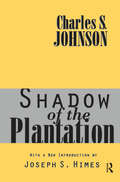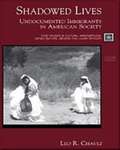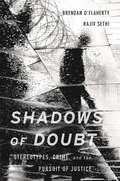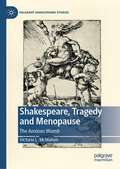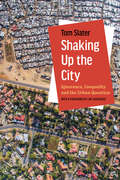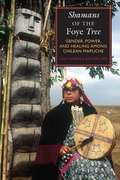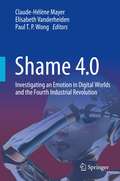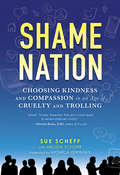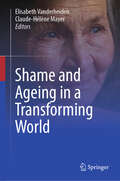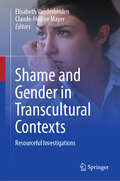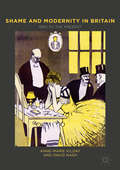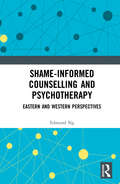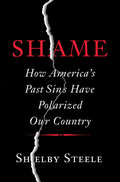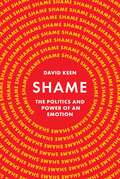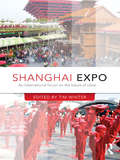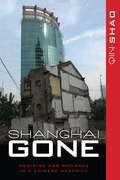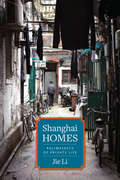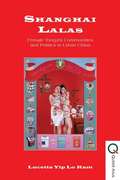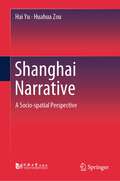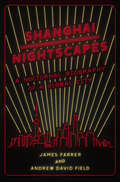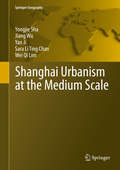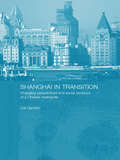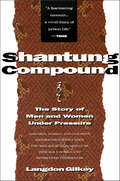- Table View
- List View
Shadow of the Plantation
by Charles S. JohnsonShadow of the Plantation focuses on descendants of slaves in one rural Southern community in the early part of this century. In the process, Johnson reviews the troubled history of race relations in the United /States. When reread half a century after it was first written, Shadow of the Plantation is clearly revealed as a remarkably perceptive and fresh comment on race relations and the triumph of individuals over circumstances.Charles Johnson's book is significant for its use of multiple methodologies. The research took place in an ecological setting that was a dynamic element of the life of the community. The book is a multifaceted, interpretive survey of the 612 black families that composed the rural community of Macon County, Alabama, in the late 1920s and early 1930s. Johnson describes and analyzes their families, economic situation, education, religious activities, recreational life, and health practices.Shadow of the Plantation manages to be both historically accurate and foresighted at the same time. It is as much a book about today as it is a discussion of yesterday. This volume is an important study that will be of value to sociologists, anthropologists, and black studies specialists.
Shadowed Lives: Undocumented Immigrants in American Society
by Leo R. ChavezOne of the few case studies of undocumented immigrants available, this insightful anthropological analysis humanizes a group of people too often reduced to statistics and stereotypes. The hardships of Hispanic migration are conveyed in the immigrants' own voices while the author's voice raises questions about power, stereotypes, settlement, and incorporation into American society.
Shadows of Doubt: Stereotypes, Crime, and the Pursuit of Justice
by Brendan O'Flaherty Rajiv SethiCrime and punishment occur under extreme uncertainty. Offenders, victims, police, judges, and jurors make high-stakes decisions with limited information under severe time pressure. With compelling stories and data on how people act and react, O’Flaherty and Sethi reveal the extent to which we rely on stereotypes as shortcuts in our decision making.
Shadows of Time: Unveiling Crime, Victims, and Aging (International Perspectives on Aging #46)
by Jason PowellShadows of Time: Unveiling the Intersection of Crime, Victims, and Aging is a comprehensive exploration of the complex relationship between crime, victims, and the aging population. Whilst older people are visible as an aging population, they are invisible as a victim population or even more controversially, as an offending population. This book delves into the challenges, vulnerabilities, and unique obstacles faced by older adults who become victims of crime and offenders of crime across cultures. It is one of a tiny handful of books that explores the relationship of aging, victimization and criminality. To make sense of such issues, there will be a critical exploration of the links between theory, policy and practice. The primary purpose of this book is to shed light on the often-overlooked issue of elderly victimization and offending and to raise awareness about its impact.
Shakespeare and Renaissance Ethics
by John D. Cox Patrick GrayWritten by a distinguished international team of contributors, this volume explores Shakespeare's vivid depictions of moral deliberation and individual choice in light of Renaissance debates about ethics. Examining the intellectual context of Shakespeare's plays, the essays illuminate Shakespeare's engagement with the most pressing moral questions of his time, considering the competing claims of politics, Christian ethics and classical moral philosophy, as well as new perspectives on controversial topics such as conscience, prayer, revenge and suicide. Looking at Shakespeare's responses to emerging schools of thought such as Calvinism and Epicureanism, and assessing comparisons between Shakespeare and his French contemporary Montaigne, the collection addresses questions such as: when does laughter become cruel? How does style reflect moral perspective? Does shame lead to self-awareness? This book is of great interest to scholars and students of Shakespeare studies, Renaissance studies and the history of ethics.
Shakespeare, Tragedy and Menopause: The Anxious Womb (Palgrave Shakespeare Studies)
by Victoria L. McMahonShakespeare was not only aware of the socio-cultural fears and anxieties generated by the older woman’s body but with the characterization of his tragic ageing females, Shakespeare becomes the first literary giant to explore the physiological and psychosocial condition that we have come to know as ‘menopause’. Although ‘menopause’ was not defined as a medical, physiological or sociocultural event for the early moderns, this book argues that such a medical and cultural transition can, in fact, be identified by sub-textual clues distinguished by various embodied anxieties. It explores several ageing women of the Shakespearean tragedies as they transition through this liminal menopausal period. Theoretically underscored by humoral theory, the analysis is metonymically centered upon the womb as the seat of menopausal anxiety. These menopausal undercurrents, not only permeate the dramatic action of each play, but also emanate outward to reflect the medical, physiological, cultural, social, and religious concerns generated by the ageing woman of the early modern period at large.
Shaking Up the City: Ignorance, Inequality, and the Urban Question
by Tom SlaterShaking Up the City critically examines many of the concepts and categories within mainstream urban studies that serve dubious policy agendas. Through a combination of theory and empirical evidence, Tom Slater "shakes up" mainstream urban studies in a concise and pointed fashion by turning on its head much of the prevailing wisdom in the field. To this end, he explores the themes of data-driven innovation, urban resilience, gentrification, displacement and rent control, neighborhood effects, territorial stigmatization, and ethnoracial segregation. With important contributions to ongoing debates in sociology, geography, urban planning, and public policy, this book engages closely with struggles for land rights and housing justice to offer numerous insights for scholarship and political action to guard against the spread of an urbanism rooted in vested interest.
Shamans of the Foye Tree
by Ana Mariella BacigalupoDrawing on anthropologist Ana Mariella Bacigalupo's fifteen years of field research, Shamans of the Foye Tree: Gender, Power, and Healing among Chilean Mapuche is the first study to follow shamans' gender identities and performance in a variety of ritual, social, sexual, and political contexts. To Mapuche shamans, or machi, the foye tree is of special importance, not only for its medicinal qualities but also because of its hermaphroditic flowers, which reflect the gender-shifting components of machi healing practices. Framed by the cultural constructions of gender and identity, Bacigalupo's fascinating findings span the ways in which the Chilean state stigmatizes the machi as witches and sexual deviants; how shamans use paradoxical discourses about gender to legitimatize themselves as healers and, at the same time, as modern men and women; the tree's political use as a symbol of resistance to national ideologies; and other components of these rich traditions. The first comprehensive study on Mapuche shamans' gendered practices, Shamans of the Foye Tree offers new perspectives on this crucial intersection of spiritual, social, and political power.
Shame 4.0: Investigating an Emotion in Digital Worlds and the Fourth Industrial Revolution
by Elisabeth Vanderheiden Claude-Hélène Mayer Paul T. P. WongThis edited volume provides new perspectives on how shame is experienced and transformed within digital worlds and Industry 4.0. The editors and authors discuss how individuals and organisations can constructively transform shame at work, in professional and private contexts, and with regard to socio-cultural lifestyle changes, founded in digitalisation and Industry 4.0. The contributions in this volume enable researchers and practitioners alike to unlock the topic of shame and its specifics in the highly dynamic and rapidly changing times to explore this emotion in depth in connection with remote workplaces, home office, automated realities and smart systems, or digitalised life- and working styles. By employing transdisciplinary and transcultural perspectives, the volume further discusses shame in the context of new lifestyles, religion, gender, sexual suppression, mental illness, and the nature of citizenship. Researchers, practitioners and students in the fields of industrial and organisational psychology, positive psychology, organisational studies, future studies, health and occupational science and therapy, emotion sciences, management, leadership and human resources will find the contributions highly topical, insightful and applicable to practice. Fresh, timely, thought-provoking with each turn of the page, this impressive volume explores shame in today’s world. Moving beyond the simple “guilt is good; shame is bad” perspective, authors from diverse disciplines examine adaptive and maladaptive aspects of shame in the context of contemporary issues (e.g., social media use, COVID-19) via multiple cultural and social lenses. Aptly named, Shame 4.0 is a treasure trove of rich ideas ripe for empirical study – a blueprint for the next generation of research on this complex and ubiquitous emotion. Bravo! --June Tangney, PhD, University Professor and Professor of Psychology, George Mason University, USA Uncovering Shame - To a much greater extent than other emotions like anger, grief, and fear, until recently most shame in modern societies has been hidden from sight. The text you see in this book is one of the steps that is being taken to make it more visible and therefore controllable. -- Thomas Scheff, Prof. Emeritus Department of Sociology, UCSB, Santa Bararbara, Ca.
Shame Nation: The Global Epidemic Of Online Hate
by Melissa Schorr Sue Scheff Monica Lewinksy"Engaging, sharp, and important — Shame Nation will inspire you to open your eyes and be better." — Theresa Payton, CEO of Fortalice Solutions and Deputy Director of Intelligence on CBS' HuntedIn today's digitally driven world, disaster is only a click away. A rogue tweet could bring down a business; an army of trolls can run a celebrity off-line; and virtual harassment might cause real psychological damage. Shame Nation is the first book to both study the fascinating phenomenon of online shaming, and offer practical guidance and inspiring advice on how to prevent and protect against cyber blunders and faceless bullies. Author and acclaimed Internet safety expert Sue Scheff unveils all sides of an issue that it only becoming more relevant day by day while drawing from the expertise of other top professionals spanning fields including law, psychology, and reputation management.From damning screenshots to revenge porn, Shame Nation shines a light on the rising trend of an online shame culture and empowers readers to take charge of their digital lives.
Shame and Ageing in a Transforming World
by Elisabeth Vanderheiden Claude-Hélène MayerThe book provides a comprehensive overview of research and concepts related to shame and ageing, in the context of social change, upheavals and paradigm shifts, from transdisciplinary, cultural and transcultural perspectives. Drawing upon the editors' previous works on the topic of shame, this volume discusses the contexts of shame and ageing from theoretical, conceptual, and empirical perspectives. The toxic and stressful aspects of shame have been the focus of scientific analysis and discourse on shame and ageing. This volume explicitly makes the dimensions of shame a resource for individuals, and collective transformation processes the object of research in the context of ageing. It looks at emerging lifestyle, political, socio-economic and health contexts. It looks at how and why the frequency, intensity and handling of feelings of shame change over the course of life; the impact of shame on emotional well-being and mental health of older people; the impact of shame on social relationships and social engagement of older people in different cultures; the role of cultural values and norms in the development and processing of feelings of shame, especially in older people, and how these can be used for self-development; and the differences in the way older people in different cultures deal with feelings of shame and the way these can be used to develop effective strategies and techniques for older people to cope with shame. The editors and contributors thereby take cultural and gender aspects, as well as positive psychology and resource-orientated concepts, such as salutogenesis, resilience, happiness, fortitude, locus of control, faith- or strengths-based approaches into account and contextualize them against processes of social upheaval and transformation.
Shame and Gender in Transcultural Contexts: Resourceful Investigations
by Elisabeth Vanderheiden Claude-Hélène MayerThis volume is envisioned as a primary reference in research, studies and concepts on shame through the lens of gender and from transdisciplinary, cultural and transcultural perspectives. It sheds light on the state of the art regarding shame and its meaning in the context of gender from theoretical, conceptual, and empirical perspectives from the standpoint of positive psychology. Since the experience of shame, the expression of shame as well as the individual or collective handling of shame depends in a special way on cultural factors, special importance has been given in the chapters to the consideration of cultural framework conditions. This volume is founded on the editors' first three publications on shame from positive psychology perspectives and an upcoming work on shame and ageing.
Shame and Modernity in Britain
by Anne-Marie Kilday David S. NashThis book argues that traditional images and practices associated with shame did not recede with the coming of modern Britain. Following the authors' acclaimed and successful nineteenth century book, Cultures of Shame, this new monograph moves forward to look at shame in the modern era. As such, it investigates how social and cultural expectations in both war and peace, changing attitudes to sexual identities and sexual behaviour, new innovations in media and changing representations of reputation, all became sites for shame's reconstruction, making it thoroughly modern and in tune with twentieth century Britain's expectations. Using a suite of detailed micro-histories, the book examines a wide expanse of twentieth century sites of shame including conceptions of cowardice/conscientious objection during the First World War, fraud and clerical scandal in the interwar years, the shame associated with both abortion and sexual behaviour redefined in different ways as 'deviant', shoplifting in the 1980s and lastly, how homosexuality shifted from 'Coming Out' to embracing 'Pride', finally rediscovering the positivity of shame with the birth of the 'Queer'.
Shame-informed Counselling and Psychotherapy: Eastern and Western Perspectives
by Edmund NgUnhealthy or maladaptive shame is believed by many to be the root cause of a diverse range of mental health problems. If we want to offer a more reparative healing to people contending with these psychological issues, we must ultimately trace back and resolve their underlying shame. This book offers researchers practitioners and students a balance of theoretical and empirical evidence for a practical approach in shame-informed counselling and psychotherapy approach. Drawing on empirical field study evidence on shame, and making references to both Western and Eastern literature on the subject, Ng advocates that shame-informed interventions be applied following or alongside the contemporary counselling modalities and protocols. Using his 15 years’ professional practice in the field, he offers a shame-informed counselling and psychotherapy approach which aims not merely to help the individual cope with or suppress the shame as commonly advocated in current literature, but also deals with its roots through the restructuring of core beliefs and early memories.
Shame: How America's Past Sins Have Polarized Our Country
by Shelby SteeleThe greatest barrier to racial equality today is not overt racism, Shelby Steele argues in [Title TK], but white liberals. Under the guise of benevolence, liberals today maintain their position of power over blacks by continuing to cast them as victims in need of saving. This ideology underlies liberal social policies from affirmative action to welfare, which actually exacerbate racial inequality rather than mitigating it. Drawing on empirical data as well as his own personal experience, Steele demonstrates that these policies have not only failed, but have made it impossible to address the problems that plague the modern black community, and have ensured that black Americans will never be truly equal to their white countrymen, in their own minds or in practice. Forthright and persuasive, [Title TK] offers an unflinching look at the failures of liberalism and a compelling case that a return to conservative principles is the only way forward for African Americans--and for the nation.
Shame: The Politics and Power of an Emotion
by David KeenThe uses of shame (and shamelessness) in spheres that range from social media and consumerism to polarized politics and mass violenceToday, we are caught in a shame spiral—a vortex of mutual shaming that pervades everything from politics to social media. We are shamed for our looks, our culture, our ethnicity, our sexuality, our poverty, our wrongdoings, our politics. But what is the point of all this shaming and countershaming? Does it work? And if so, for whom?In Shame, David Keen explores the function of modern shaming, paying particular attention to how shame is instrumentalized and weaponized. Keen points out that there is usually someone who offers an escape from shame—and that many of those who make this offer have been piling on shame in the first place. Self-interested manipulations of shame, Keen argues, are central to understanding phenomena as wide-ranging as consumerism, violent crime, populist politics, and even war and genocide. Shame is political as well as personal. To break out of our current cycle of shame and shaming, and to understand the harm that shame can do, we must recognize the ways that shame is being made to serve political and economic purposes.Keen also traces the rise of leaders on both sides of the Atlantic who possess a dangerous shamelessness, and he asks how shame and shamelessness can both be damaging. Answering this question means understanding the different types of shame. And it means understanding how shame and shamelessness interact—not least when shame is instrumentalized by those who are selling shamelessness. Keen points to a perverse and inequitable distribution of shame, with the victims of poverty and violence frequently being shamed, while those who benefit tend to exhibit shamelessness and even pride.
Shanghai Expo: An International Forum on the Future of Cities (CRESC)
by Tim WinterIn 2010 Shanghai hosted the largest, most spectacular and most expensive expo ever. Attracting a staggering 73 million visitors, and costing around US$45 billion dollars, Shanghai Expo broke the records in the history of world's fairs and universal expositions. With more than half of the world’s population now living in cities, many of which face uncertain futures, this mega event confronted some of the key challenges facing humanity in the 21st Century, with its theme Better City, Better Life. Just two years after the Beijing Olympics, Shanghai Expo encapsulated a moment in history defined by China’s rise as a global superpower, and by the multiple challenges associated with developing more sustainable cities. The thirteen essays here, written by a team of interdisciplinary researchers, offer a uniquely detailed analysis of this globally significant event. Chapters examine displays of futurity and utopia, the limitations of inter-cultural dialogue, and the ways in which this mega-event reflected its geo-political and cultural moment. Shanghai Expo also concentrates on the interplay between declarations towards urban sustainability, and the recent economic, demographic and socio-political trajectories of Shanghai and China more broadly. It will appeal to students and scholars of sociology, history, politics, international relations, economics, Asian studies, China studies, sustainability, and urban studies.
Shanghai Gone: Domicide and Defiance in a Chinese Megacity (State & Society in East Asia)
by Qin Shao&“One of the best accounts of the reality of gentrification and urban development in China . . . grounded with solid historical, ethnographic and legal evidence&” (Urban Studies). In recent decades, the centuries-old city of Shanghai has been demolished and rebuilt into a gleaming megacity. With its world famous skyscrapers, it now ranks with New York and London as a hub of global finance. But that transformation has come at a grave human cost. In Shanghai Gone, Qin Shao applies the concept of domicide—the eradication of a home against the will of its dwellers—to the sweeping destruction of neighborhoods, families, and life patterns that made way for the new Shanghai. Shao gives voice to the holdouts and protesters who resisted domicide and demanded justice. She follows, among others, a reticent kindergarten teacher turned diehard petitioner; a descendant of gangsters and squatters who has become an amateur lawyer for evictees; and a Chinese Muslim who has struggled to recover his ancestral home in Xintiandi, an infamous site of gentrification dominated by a well-connected Hong Kong real estate tycoon. Highlighting the wrenching changes spawned by China&’s reform era, Shao vividly portrays the corrupt and rapacious pursuit of growth and profit, the personal wreckage it has left behind, and the enduring human spirit it has unleashed.
Shanghai Homes: Palimpsests of Private Life (Global Chinese Culture)
by Jie LiIn the dazzling global metropolis of Shanghai, what has it meant to call this city home? In this account—part microhistory, part memoir—Jie Li salvages intimate recollections by successive generations of inhabitants of two vibrant, culturally mixed Shanghai alleyways from the Republican, Maoist, and post-Mao eras. Exploring three dimensions of private life—territories, artifacts, and gossip—Li re-creates the sounds, smells, look, and feel of home over a tumultuous century. First built by British and Japanese companies in 1915 and 1927, the two homes at the center of this narrative were located in an industrial part of the former "International Settlement." Before their recent demolition, they were nestled in Shanghai's labyrinthine alleyways, which housed more than half of the city's population from the Sino-Japanese War to the Cultural Revolution. Through interviews with her own family members as well as their neighbors, classmates, and co-workers, Li weaves a complex social tapestry reflecting the lived experiences of ordinary people struggling to absorb and adapt to major historical change. These voices include workers, intellectuals, Communists, Nationalists, foreigners, compradors, wives, concubines, and children who all fought for a foothold and haven in this city, witnessing spectacles so full of farce and pathos they could only be whispered as secret histories.
Shanghai Lalas: Female Tongzhi Communities and Politics in Urban China
by Lucetta Yip Lo KamThis is the first ethnographic study of 'lala' (lesbian, bisexual, and transgender) communities and politics in China, focusing on the city of Shanghai. Based on several years of in-depth interviews, the volume concentrates on 'lala's' everyday struggle to reconcile same-sex desire with a dominant rhetoric of family harmony and compulsory marriage, all within a culture denying women's active and legitimate sexual agency. Lucetta Yip Lo Kam reads discourses on homophobia in China, including the rhetoric of 'Chinese tolerance' and considers the heteronormative demands imposed on 'tongzhi' subjects. She treats 'the politics of public correctness' as a newly emerging 'tongzhi' practice developed from the culturally specific, Chinese forms of regulation that inform 'tongzhi' survival strategies and self-identification.
Shanghai Narrative: A Socio-spatial Perspective
by Hai Yu Huahua ZouThis book focuses on urban development in Shanghai over the past four decades, which is composed of two major development processes—the development of new spaces and the renewal of old ones. Seeking to bring the concept of space back into social analysis, the book explores changes affecting communities, interpersonal interactions, lifestyles and social mindsets in Shanghai from a spatial perspective. What’s more, all these social themes are presented using a narrative of spatial representation and spatialization. The book combines both academic and documentary-style contributions. It also provides cutting-edge research on the most representative case in Shanghai. As the book demonstrates, the story of social spaces in Shanghai is more than a combination of social analysis and spatial analysis but also involves historical analysis and contemporary narrative.
Shanghai Nightscapes: A Nocturnal Biography of a Global City
by James Farrer Andrew David FieldThe pulsing beat of its nightlife has long drawn travelers to the streets of Shanghai, where the night scene is a crucial component of the city’s image as a global metropolis. In Shanghai Nightscapes, sociologist James Farrer and historian Andrew David Field examine the cosmopolitan nightlife culture that first arose in Shanghai in the 1920s and that has been experiencing a revival since the 1980s. Drawing on over twenty years of fieldwork and hundreds of interviews, the authors spotlight a largely hidden world of nighttime pleasures—the dancing, drinking, and socializing going on in dance clubs and bars that have flourished in Shanghai over the last century. The book begins by examining the history of the jazz-age dance scenes that arose in the ballrooms and nightclubs of Shanghai’s foreign settlements. During its heyday in the 1930s, Shanghai was known worldwide for its jazz cabarets that fused Chinese and Western cultures. The 1990s have seen the proliferation of a drinking, music, and sexual culture collectively constructed to create new contact zones between the local and tourist populations. Today’s Shanghai night scenes are simultaneously spaces of inequality and friction, where men and women from many different walks of life compete for status and attention, and spaces of sociability, in which intercultural communities are formed. Shanghai Nightscapes highlights the continuities in the city’s nightlife across a turbulent century, as well as the importance of the multicultural agents of nightlife in shaping cosmopolitan urban culture in China’s greatest global city. To listen to an audio diary of a night out in Shanghai with Farrer and Field, click here: http://n.pr/1VsIKAw.
Shanghai Urbanism at the Medium Scale
by Jiang Wu Yongjie Sha Yan Ji Sara Li Ting Chan Wei Qi LimThis book focuses on observing and understanding the urban planning and relevant development patterns applied to the creation of urban districts against the backdrop of the current rapid urbanization and transformation of Shanghai on its way to becoming a world city. Based on a review of the four stages of city evolution, a series of case studies on typical urban districts through the city's building history to date points out key issues in connection with current developments. Three rapidly developing districts in Shanghai are studied with regard to alternative urban planning and design solutions, and further opinions from other perspectives including city government, real estate development and professional education, reveal challenges in the practical implementation of changes. This book indeed provides an approach to in-depth observation and understanding of urban planning and current development patterns at the medium scale of Chinese urbanization for those from academic, professional, investment, public administration and related circles who would like to join the urban transformation process. Associate Professor Yongjie Sha and Professor Jiang Wu work at Tongji University. Yan Ji is an architect and urban designer in Shanghai. Sara Li Ting Chan and Wei Qi Lim work in Singapore as architect and planner in government service.
Shanghai in Transition: Changing Perspectives and Social Contours of a Chinese Metropolis
by Jos GambleIn the decades following the introduction of Communist Party rule in Shanghai in 1949, the city's economy, infrastructure and links with the world all atrophied. However, the past decade has seen far-reaching economic reforms implemented to recreate Shanghai as a cosmopolitan, world financial and trade centre. This book focuses on the lives of local residents and their perceptions of their changing city, and presents an evocative series of ethnographic perspectives of the city's shifting sociological landscape in this period of transition.
Shantung Compound: The Story of Men and Women Under Pressure
by Langdon GilkeyThis vivid diary of life in a Japanese internment camp during World War II examines the moral challenges encountered in conditions of confinement and deprivation.
